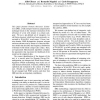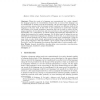12 search results - page 2 / 3 » The Noisy Channel Model for Unsupervised Word Sense Disambig... |
EMNLP
2004
13 years 6 months ago
2004
This paper presents Domain Relevance Estimation (DRE), a fully unsupervised text categorization technique based on the statistical estimation of the relevance of a text with respe...
AAAI
1998
13 years 6 months ago
1998
We present a corpus{based approach to word{sense disambiguation that only requires information that can be automatically extracted from untagged text. We use unsupervised techniqu...
ACL
2004
13 years 6 months ago
2004
We describe two probabilistic models for unsupervised word-sense disambiguation using parallel corpora. The first model, which we call the Sense model, builds on the work of Diab ...
ICTAI
2009
IEEE
13 years 11 months ago
2009
IEEE
Knowledge plays a central role in intelligent systems. Manual knowledge acquisition is very inefficient and expensive. In this paper, we present (1) an automatic method to acquire...
JUCS
2002
13 years 4 months ago
2002
: When the words of a language are communicated via a noisy channel, the language property of error-detection ensures that no word of the language can be transformed to another wor...


